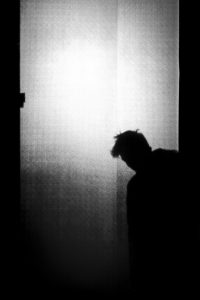What is Shadow Work?
The term 'shadow work' was coined by Dr. Connie Zweig PH.D. She says it is "the continuing effort to make a conscious, creative relationship with the tricky, elusive unconscious — the blind spot that eludes us no matter where we look."
What is Our Shadow Self?
According to the psychologist Carl Jung, our shadow is the unconscious aspects of our personality. It is our subconscious, the source of our dreams, the dark that hangs over us and sometimes pokes through in unwanted ways. Jung attributed it to repressed childhood memories and referred to it as “the reservoir for human darkness”. He stated that the shadow self was mostly negative, but also had many positive aspects. He saw it as the repository of our true self and the source of our creativity.
So our shadow consists of those parts of ourselves we’d rather not show to others, and even to ourselves. The shadow conceals aspects of our personality that are not seen by the consciousness.

Photo Credit: FotoGrazio via Compfight cc
How is the Shadow Formed?
Our shadow is ‘trained’ into being. As young children, we are told what is acceptable and what is not according to the standards of the society we live in. This is not necessarily a bad thing – we all need to learn to function in society. It wouldn’t be good for a 30-year-old to throw a temper tantrum in a supermarket. However, in our efforts to please and to draw love and approval to us, we suppress aspects of our personality that maybe shouldn’t always be suppressed.
A child who loves to experiment with painting is not allowed to play in such a way in case she makes a mess. Perhaps her paints are taken away or not replaced when they run out, so she puts aside that form of self-expression and amuses herself instead with crayons and a coloring book. Another child is told that he is ‘wrong’ to love the color pink and My Little Pony. A confident girl is always undermined until she becomes compliant to keep her parents’ affection. An assertive boy is told that he is bossy by his friends, so he learns to hide his convictions. Back in the day, it was called ‘smoothing off the rough edges’.
One of the leading causes of the forming of the shadow is the experience of shame. Shame and humiliation are the worst feelings in the world, and human beings will do anything to avoid it. Some will alter their behavior and true selves, including their sexuality. Others will pretend they are not affected by continuing the actions and impulses that brought the shame upon them. They make themselves immune to shame and turn it into pride in their bad behavior, such as soccer hooliganism or violent racism.
Other shadow aspects are formed if we are subject to abuse of some kind, whether physical, emotional or mental.
Think of the shadow self as a sort of file cabinet. Whenever we experienced something sad or traumatic or were instructed to repress some trait by our parents, we flung the offending event or behavior into the file cabinet and pushed the drawer shut with a mighty clang, never to be opened again. We might have thousands of these cabinets, or repressed memories, locked away in our subconscious. In a way this is self-rejection. Those repressed feelings, emotions, and memories haven’t gone anywhere. They are still there, smoldering steadily.

Photo Credit: kiera.chan via Compfight cc
How Do We Identify Our Shadow Self?
There are two ways in which we can identify our shadow. The first one is denial. Those aspects that we deny, disown and reject about ourselves are usually those that we’ve filed away. Often others can see these traits but we cannot. In other words, those aspects are our ‘blind spots’.
Sometimes we can recognize shadow-oriented behavior after the fact because we feel guilt and shame (there’s that shamefulness again).
The second way is projection. We can identify it by paying attention to our judgment of other people. Why don’t we like that woman? Why does that man appear obnoxious to us? Why does that person always do that? Often we project our shadow aspects onto others. Notice when you diss, blame or denigrate someone – is it for something you have hidden in your psyche? If you answered no, you're back to denial.
How Does Our Shadow Hinder Us?
Some people remain unaware of their shadow all their lives. Others have so severely repressed their early memories that the shadow is compelled to ‘leak’ through and express itself in passive-aggressiveness, rage, addiction and other self-destructive behavior. Worse still is when it is turned outward and manifests as violence and even murder.
It can also assert itself in automatic behavior, i.e. bad habits, eating when stressed, and auto-irritable responses to others. Even boredom and laziness are attributed to the shadow.
Can Our Shadow Be Helpful to Us?
Yes, our shadow side can be extremely helpful. As Jung said it is the ‘seat of creativity’, meaning that artists, musicians, sculptors, writers, etcetera will know their best work comes from reaching inside their shadow self. Mike Nichols, the film director, said, “The unconscious is our best collaborator.”
It is possible to retrieve some of those personality traits that were ‘beaten’ out of us and wear them proudly with shadow work. Such things as confidence (remember when your parents told you to “stop showing off”?), assertiveness (you never said “no” to grown-ups), risk-taking (you can’t do that, you might hurt yourself) and the longing to reach out to others less fortunate (you are not to play with those children).

Photo Credit: Alex Mueller's Street Photography via Compfight cc
Is the ‘Mid-life Crisis’ Caused by Our Shadow?
It is likely if you made it through to middle age relatively unscathed, but wondering why you feel empty and unfulfilled, as though part of yourself is missing, that a journey into your dark side will be beneficial. When we hit 40 or 50 or 60, it can be a turning point, a now-or-never moment. We determine that we will make deep changes, that life has to be different from here onward.
Shadow work can release so much hidden stuff. For some, it becomes a life’s journey to open each and every one of those file cabinet drawers.
What are the Four Stages of Shadow Work?
The four stages of shadow work are:
- Denial
- Projection
- Integration
- Transmutation
Denial and projection, we covered above. They involve the initial recognition that A. we have a shadow self and B. we may be able to do something about, or with it.
Integration digs deeper. We want to find those hidden aspects, bring them into the light of consciousness, dust them off and see if we can use them to make ourselves whole again. There are a whole raft of techniques to do this work, not least of which is working with another person. Someone who is sympathetic and empathetic to your cause. Usually, a counselor or therapist is the ideal person for the job.
Transmutation is the process of taking something and turning it into something else. So, for example, if you discover that deep inside you there is a hot, burning ball of rage, then by the process of integration and transmutation you learn to use that rage in a positive way. Perhaps it can be expressed as art or writing. Maybe you could direct the energy into campaigning for a cause or injustice that pierced through to the rage?
Can I Face My Own Shadow by Myself?
You can face your own shadow. If you are constantly feeling that your shadow side is trying to make itself heard, if you are always self-sabotaging yourself, if you think you might be seeing your shadow expressed by someone else, usually by a loved one, if you believe there is something in you preventing you from feeling happy, then shadow work is a good idea. As previously mentioned, the best way is by working with a qualified individual who can gently guide you through the sometimes very uncomfortable process of integration and transmutation.
It is possible by reading and journaling you can bring your shadow side into the light. Many people have successfully freed themselves from obsessive thinking, self-destructive behavior and the feeling that there is a great big missing chunk in their life. However, it’s difficult. You may be overlooking the obvious – remember, we’re talking about a lot of hidden file cabinets and blind spots.
What Can I Expect During the Process of Shadow Work?
Be prepared for anything. You may discover a whole rat's nest of memories. You may find out things about your family that you wish you hadn’t. You will certainly meet aspects of yourself that you may have only suspected existed. Most people say, when emerging from the other side, that the journey was worth it, that they feel better, happier and whole.


0 Responses
HI my name is lauren B., I have a question about healing your shadow once you uncover it in the subconscious mind. Here is the backstory for a repressed emotion that has been extremely difficult for me to understand and heal. So, one of my past lives was of a slaveowner man. He had power and many slaves, he raped and committed many morally wrong acts against the black community. He actions led to him being killed by a black man. He had a lot of repressed rage from when he died towards the black community due to his ignorance being acceptable in that era.Now I am living with a mental illness directly correlated to this event and it has been giving me shame,guilt and fear because I have no idea how to address this repressed "racism" or rage/ignorance towards blacks. I know it is not from this lifetime but it has carried on to this life and has caused me much mental turmoil and problems. How would you heal this repressed event along with the emotions in a healthy way?
Thank you
Hi Lauren, I would definitely seek out professional help from someone who deals with this kind of mental illness. You can’t repress it and you can’t live with it, so you need to learn how to gently let it go. I can’t recommend anyone in particular but I am sure there is someone out there. In the meantime, you could try to work out these feelings of racism and anger by using exercises such as meditation. Ask for guidance and see what happens. Best of luck and be well soon.